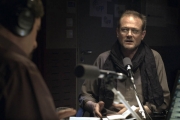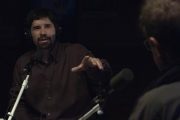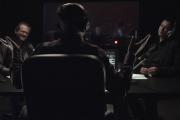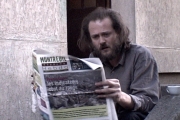![]() Presentation by and discussion with director, screenwriter and actor Vincent Glenn and executive producer Moïra Chappedelaine-Vautier
Presentation by and discussion with director, screenwriter and actor Vincent Glenn and executive producer Moïra Chappedelaine-Vautier
They were unemployed, they became extremely rich in record time, and, of course, this poses a few problems for them . . . But that is not the main thing. What matters is that, meanwhile, they have completely transformed the world economy. How did they do it? At the beginning there was a simple idea, a straightforward idea . . .
Cast & Crew
Director • Vincent Glenn
Director of Photography • Nara Keo Kosal
Screenwriters • Vincent Glenn, Antoine Dumontet, Philippe Larue, Frédéric Riclet & Barbera Visser
Music composer • Fantazio, Tony Allen and Pierre Boscheron
Producer • Moïra Chappedelaine-Vautier
Starring :
Vincent Glenn, Dan Herzberg, Nicolas Le Quang, Julie de Bona and Marlène Michel
Choose a picture to see the filmography (source : IMDB)
![]()
Why did you work on removing the boundary between reality and fiction? In particular with regard to several characters playing themselves?
Historically, a documentary is based on the notion of a “document”, it deals with filming “reality” and there is an understanding with the spectators to whom the documentary maker presents something “real”. If this is the understanding at the outset, any spectator who is not too naïve can legitimately look for any untruths hidden behind the “truth”: any non-verified statement or figures, a deed that was exaggerated or one that was truncated.
When it comes to fiction, the reverse phenomenon can occur. A priori, the accepted code means that it is “overall untrue”, recreated, played, acted, like a play . . . but when that works properly, it can make people want to imagine the opposite, everything that is true behind the film, everything it can make you think about, that you have seen in real life. The most famous and cleverest example is undoubtedly Chaplin’s The Dictator, which shows an almost real-life Hitler behind Hynkel’s caricature . . . That is what art, drama, poetry can do! Leave room for the spectator to create part of the meaning for himself. I like the idea that with fiction, you can create a desire for “truth” or even “acting out”. In any case, for many years I have enjoyed watching hybrid films, which you can never be sure if they are serious or not, a detective story or science-fiction . . . I wanted to explore these boundaries, lead people down the wrong track and encourage spectators to find their own way.
Could you tell us something about the rating agency at the heart of your film?
In the modern imagination, a rating agency represents the notion of information enhanced by the notion of efficiency. In other words, information that has consequences in reality. The fear of being poorly rated by these agencies or of losing a reputation has been used as a primary argument for years by governments: if they do not reduce public spending, they will be pinpointed by these agencies and banks will not be as likely to lend them money, which means their debt will increase even more, etc.
On the pretext of these reports, politicians cut back on public services and therefore on community property . . . The opposite of this trend, the idea of a “citizens rating agency” emerged from within the heart of social movements. This is one of the starting points of the film: what would happen if a new kind of rating agency had influence comparable to that of the best known ones: Fitch, Moody’s and Standard & Poor’s, not only based on financial criteria but also on ecological and social criteria?
Does the fact that the film was produced by a cooperative have any particular consequences?
The production gradually came together over time, most often without money or with very little. In the end, more than 500 people were involved in the film in various ways. We turned our economic weakness into a strength but it is easier to say that now it is finished and I would not wish for anyone to have to work under such insecure conditions as we did.
My film only came into existence because of the contributions and energy of a whole crowd of people.
The individual/collective duality is one of the elements that carries the film. It is inspired by numerous conflicts I have experienced and the various attempts to keep our cooperative alive for the last ten years. In any team, the question of ego-management is essential, especially if you see things from an anti-authoritarian viewpoint . . . which is what Viveret would humorously call the GHF, the “Goddamn Human Factor” or the necessary recourse to ecology . . .
It is all very well claiming you work according to the most fraternal or egalitarian principles, human realities do not fit in there by magic. Anyone who has worked with even 5 or 10 people as a “team” knows that democracy is a principle that continually needs updating, consolidating and reworking. I dream of one day being a part of a film like the Monty Pythons, with a collective author going by a group name. That is not the case of this film, which is more a personal film with lots of people involved than a “collective film”. The fact I was working within a cooperative was decisive; it meant there were lots of discussions and a certain financial fragility but above all we had great autonomy and a radical respect for the authors’ opinions.
In the film, the rating agency catalyses values and hopes. Do these values and hopes exist?
For me, they definitely do, even if they are not yet visible in the mass media. There is a very strong thirst for progressive proposals with a human approach, such as political statements without doublespeak.
It is statistically proven that countries in which there is the most violence are those where there are the greatest social inequalities and this makes humanity bi-polar, just like an individual suffering from this disorder. The question is “how long”? The (crazy) ultra wealth on one side and extreme poverty (which drives people mad) on the other.
And yet I have seen many places where if such Utopia is a practical reality on a human scale, people are willing to adopt it. And when this happens, they are capable of moving mountains or walking on the moon . . .
I also believe that people have had enough of nihilism (which has become a sort of dominant ideology over the last 20 years), of cynicism-mongering and of short-term management. This has not yet formed itself into a properly coordinated political movement respected by most, but we can see the early warning signs all over the place with the multiplication of different production systems that are more respectful of the environment and of social considerations.
Press Kit “Enfin des bonnes nouvelles”
French ~ 4 pages ~ 2,4 Mo ~ pdf












